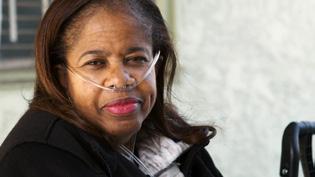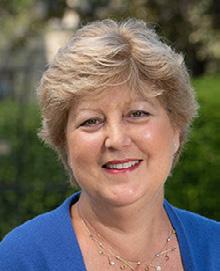2022 Annual Report
Putting patients at the center of community
























Putting patients at the center of community
















The Pulmonary Fibrosis Foundation (PFF) is dedicated to building a community of patients, lung transplant recipients, caregivers, family members, health care professionals, researchers, industry partners, and others.





One of our most effective tools for reaching this ambitious goal is the PFF Registry. This unparalleled nationwide research program, which includes the PFF Patient Registry that is administered at participating Care Centers, and the new PFF Community Registry, collects data from patients living with pulmonary fibrosis (PF) and interstitial lung disease (ILD) and many others in the community.
Now, the PFF has launched the long-awaited Community Registry!
This represents a crucial step forward for people living with PF and ILD, as well as their loved ones. The urgency to understand these diseases and develop new therapies has never been greater. The Community Registry will allow researchers to access a limited data set from multiple participant groups for the first time to answer numerous questions about PF and ILD.
People affected by PF and ILD can now join the Community Registry to share important information about their experiences with these diseases and be part of the solution.



Enrollment is easy.
To join the PFF Community Registry, sign up at pffregistry.org
3
In our community, we know too well the devastation that pulmonary fibrosis (PF) and interstitial lung disease (ILD) can create. PF and ILD have numerous causes, which bring about inflammation and lung scarring that manifests as symptoms of cough and shortness of breath. These diseases frequently worsen over time and may result in disability or death. Currently, more than 250,000 Americans live with PF or ILD.
The PFF’s priorities are clear: faster and more accurate diagnoses, better treatments, and a cure. More research is vital for improving the lives of people with PF and ILD and their families. The PFF Registry is the most efficient tool we have for giving researchers the data they need for new discoveries that can make a difference for people with PF and ILD and their families.
I have heard from patients and their families many times that they wish there was a way to help with PF and ILD research. Now, there is.
We are proud to announce the launch of the PFF Community Registry. Its primary goal is to collect detailed information regarding PF and ILD that are of deep concern, such as diagnosis, care, and outcomes for patients, caregivers, and family members who are affected by it. The PFF Community Registry is for everyone affected by PF or ILD. For the first time, caregivers and family members, and lung transplant recipients who have had PF or ILD, can join, along with people living with PF or ILD.
Meanwhile, the PFF Patient Registry continues to make important contributions to PF and ILD research, just as it has done since 2016. With the ability to access six years of patient data, researchers are making impactful use of the Patient Registry. To date, more than 40 studies have been developed or are underway using these data at no cost to PFF Care Center Network (CCN) investigators or industry partners who collaborate with a CCN investigator. The value of this research totals over $32 million.
No reflections on the PFF Registry’s accomplishments would be complete without recognizing
the work of Kevin R. Flaherty, MD, MS, who has steered the PFF Registry since its earliest days. Please join me in thanking Dr. Flaherty for his tireless leadership in making the PFF Registry what it is today.

I also want to acknowledge the many other dedicated individuals who contribute to the Registry’s success. This includes members of the PFF Registry Steering Committee, the PFF Scientific Review Committee, and the PFF Registry staff, especially PFF Registry Vice President, Junelle Speller. I also want to thank SABER at the University of Michigan for providing project management and biostatistical support and the wide array of generous financial donors. Most importantly, I am grateful to the 2,000 patients who joined the Patient Registry. They contributed to significant studies and provided us with the momentum to expand the initiative by launching the Community Registry.
In closing, I want to emphasize again that the new PFF Community Registry is open and enrolling family members, caregivers, and lung transplant recipients who have had PF or ILD. That’s in addition to patients currently living with PF or ILD, of course. Enrollment is easy. Please join us today.
Sincerely,
JOSEPH LASKY, MD Chief Medical Officer

4
DEAR FRIENDS,
We Need Your Help with the PFF Community Registry!
Researchers are working hard to understand the genetic and lifestyle effects of PF and ILD. You can help move us toward a cure by sharing information. With your help, the PFF Community Registry is fostering a community of patients, caregivers, and family members all with the same goal:
Finding answers to help diagnose, treat, and potentially cure PF and ILD.
Here’s how you can help:
• Visit pffregistry.org to join and later access the PFF Community Registry online portal.
• Complete a survey every six months at your own pace and in the comfort of your own home.
WHAT CAN YOU DO?
• If you wish, complete optional substudies on specific topics.
• Share only the information you’re comfortable sharing. How much information you provide is up to you.
• Relax knowing the PFF Community Registry database is highly secure, using the same technology trusted by doctor’s offices, hospitals, and clinical trials worldwide.

• Enjoy receiving periodic research updates via monthly emails and biannual newsletters.
With your participation, we can fast-forward medical research and improve the lives of patients with PF and ILD and their families, for today’s and future generations.
Visit the PFF Registry website and click “Join the PFF Community Registry” Complete Screening and Informed Consent Forms, plus your enrollment survey, via secure online portal Complete follow-up surveys every six months, plus optional substudies Get updates, including monthly emails and biannual newsletters Spread the word: Patients, lung transplant recipients, caregivers, and family members can join!
5
Patient Voices in the PFF Community Registry

For idiopathic pulmonary fibrosis (IPF) patient and support group leader Fred Haley, the day he enrolled in the PFF Community Registry was years in the making.

“I wanted to join the PFF Patient Registry ever since I first heard about it in 2015 but couldn’t because I didn’t receive my care at a PFF Care Center,” he says. “Now that barrier has been removed and patients can join the PFF Community Registry wherever they live in the country. This is our chance to help research.”
Now 10 years into his IPF journey, Haley benefitted from an unusually early diagnosis when his cardiologist ordered a stress test that led to a referral to a pulmonologist who recognized
the signs of PF. Haley knows that many aren’t so lucky and believes that more research is key to helping patients receive their diagnosis earlier in their disease course. To that end, he is proud to add the PFF Community Registry to the four clinical trials he has participated in.
These days, the retired IT executive works part-time as a pulmonary rehab assistant in Greensboro, North Carolina. He uses the opportunity to talk up research participation whenever he can. “Clinical trials may not be for everyone if they’re not physically up to dealing with potential side effects,” he says. “Luckily, the PFF Community Registry is not a drug trial, so there are no side effects. I encourage everyone affected by PF to participate.”
BO PUNZALAN
Chicago, Illinois
Patient with IPF
Alay Kapwa is a Filipino way to be an active participant in the PFF Community Registry. In essence, it means I am actively offering many ways that I can share and give a helping hand to others in the community.
6
Lung Transplant Patients in the PFF Community Registry
Sam Kirton vividly recalls when he received his IPF diagnosis, right down to the date and time: January 31, 2017 at 11:30 am.

By his next clinic visit, the feelings of shock had receded enough that he told the pulmonologist he wanted to participate in any research for which he was eligible. “Research is an investment in the future,” he says. “I’ve got two granddaughters, and I want them to not have to know what pulmonary fibrosis is like.”
Following a bilateral lung transplant in July 2021, Kirton is grateful that the PFF Community Registry specifically encourages people who have had lung transplants due to PF or ILD to join, because he believes the new Registry can bring the
community together. “We have an opportunity to collectively put the power of this disease to rest by making available all the information that an investigator might need,” he says. “Transplant is a part of the solution, but it’s not the ultimate solution. The ultimate solution is a more effective therapy and a cure for pulmonary fibrosis. That’s what the PFF Community Registry has the potential to enable.”
Kirton especially appreciates that being in the Community Registry means he may have the option of completing additional surveys beyond the minimum two per year. “That’s not a commitment to participate in additional research,” he says. “It just means you’re willing to learn more about future research opportunities.”
I’m all about trying to find a cure, so I signed up for the PFF Community Registry as a lung transplant recipient. I’m lucky to get a transplant, but so many of us still need a cure.
MELISSA WHEELER
Lung Transplant Recipient, Former Ironman Athlete

7
Many people believe that only patients can sign up and take part in registries. But at the PFF, we know that serious illnesses like PF and ILD affect each patient’s caregiver and family members, too.
Caregiver & Family Member Voices in the PFF Community Registry
That’s why we’re spreading the word: Caregivers and biological family members, as well as lung transplant recipients are invited to sign up for the PFF Community Registry.
“I know the power community has. And if we’re all able to come together and join this registry to offer our insights, that is where the real power lies,” says family member and former caregiver Samantha Kagel of Dallas, Texas. “We need all of the voices to be able to answer the questions that we have.”
My message is that we patients need our loved ones to speak for us when we cannot. It took me a year to come back to myself after the transplant, and my family members would have been much more able to share what I was going through than I could.
 LAURIE CHANDLER New Castle, New Hampshire PFF Board Member and Lung Transplant Recipient
LAURIE CHANDLER New Castle, New Hampshire PFF Board Member and Lung Transplant Recipient

8
FOCUS ON HELPING OTHERS
Take family therapist Stephanie Golden of Arlington, Texas. Watching her mother’s decline and death from IPF just six months after diagnosis was devastating. But she wanted to honor her mother’s memory by helping others cope with PF and ILD.

After serving as a PFF Ambassador, Golden has discovered a new way to help others and stay connected with the PF community by enrolling in the PFF Community Registry.
As a former caregiver and the biological relative of a person with IPF, her insights and experiences are important for researchers to understand.
That’s even more true since she was diagnosed with rheumatoid arthritis shortly after her mother’s death. “Having rheumatoid arthritis makes me more at risk of developing autoimmune ILD,” Golden says. “My doctor watches me closely, of course, but maybe researchers can learn something from my situation.”
My father had idiopathic pulmonary fibrosis and, thankfully, received a lung transplant. Now, I want to provide all the information I can to help researchers, scientists, and the medical community as they work to find a cure for this disease.
GREG CUNNINGHAM Birmingham, Michigan
 Family Member and Former Caregiver of Patient with PF
Family Member and Former Caregiver of Patient with PF
9
Dr. Kevin Flaherty: Leading the Charge for the PFF Registry

When Kevin R. Flaherty, MD, MS, Chair of the PFF Registry Steering Committee, began working on the PFF Registry way back in 2013, many eminent pulmonologists contributed to the PFF’s vision of what its registry should be.
“Kevin is the one who brought everyone together to shape many competing ideas and make the Registry a reality,” says Scott Staszak, PFF Chief Operating Officer. “We couldn’t have done it without him.”
With an advanced degree in biostatistics and experience serving on the University of Michigan’s institutional review board for clinical research, Flaherty brought hands-on expertise to the role, as well as a reputation as an impeccable clinician. “’Putting the patient first’ has become a buzzword, but that really is how Kevin operates,” Staszak says. “When we were designing the PFF Patient Registry, Kevin had strong feelings from years of patient care about what might be a burden to patients and what we could reasonably ask them to do.”
Flaherty also recognized the limitations of following only 2,000 patients via the PFF Care Centers and wanted to reach out into the broader community to learn how these diseases affect patients, caregivers, and family members.
From working to help secure the Registry’s initial seed funding to persuading colleagues at other PFF Care Centers to commit to Registry participation, Flaherty’s immense standing in the PF/ILD professional community opened many doors for the PFF. “People see that genuine character and caring,” Staszak says. “Everyone likes Kevin.”
Since 2016, the PFF Patient Registry has made huge amounts of data available to researchers and a clearer picture of PF is now emerging. With the launch of the new PFF Community Registry, we are poised to make even greater research contributions as we learn about the experience of individuals living with PF or ILD, and the impacts on them and their families and caregivers.”
KEVIN R. FLAHERTY, MD, MS Chair, PFF Registry Steering Committee
10
PFF Community Registry: Help Us Turn the Map PFF Blue!

In our first month, we enrolled 455 individuals in 40+ states! The sky is the limit: the PFF Community Registry has room for everyone affected by PF and ILD, so enroll today.
PFF COMMUNITY REGISTRY: PARTICIPANTS’ ENROLLMENT STATUS
You don’t have to be a patient and you can participate in multiple categories.

Participants Who Identified as Patients
Participants Who’ve Received a Lung Transplant
Participants Who Identified as Caregivers
Participants Who Identified as Family Members
NUMBER OF PARTICIPANTS IN THE PFF COMMUNITY REGISTRY BY STATE
WA 25 OR 4 ID 3 UT 2 NV 1 AZ 18 CO 9 NY 22 PA 23 MD 13 MA 13 NH 4 VT 2 ME 3 CT 6 OH 14 MI 31 MN 10 WI 6 IL 32 IN 8 IA 10 CA 44 TX 40 LA 10 FL 48 SC 7 NC 13 GA 8 AL 4 MS 2 KY 6 TN 9 KS 4 OK 3 AR 2 NE 2 MO 6 D1 NJ 18 RI 1 AK 2 11
PFF Patient Registry: Tangible Research Results
As one of the largest nonprofit funders of PF and ILD research, the PFF fund and promotes only the most promising research. The PFF Patient Registry, administered across participating PFF Care Centers, has accomplished great things in just six years.
To date, more than 40 research projects valued at over $32 million have used or are using patient clinical and sometimes biosamples and/or highresolution computed tomography images from the PFF Patient Registry. Researcher proposals to use data from the Patient Registry have increased steadily. So far in 2022, for example, the PFF has received 16 research proposals, a nearly 60% increase from the prior full year.
This year’s highlights include a scientific publication by Drs. Janet Lee and Nina Patel that looked at how cough-specific quality of life predicts disease progression. This article appeared in CHEST, the peer-reviewed journal of the American College of Chest Physicians, in March 2022.
Additionally, the 2022 American Thoracic Society International Conference featured four studies that used data from the PFF Patient Registry, including one from Dr. Hyun Kim that found an association between patients with PF and ILD living in rural locations and poor outcomes.
Researchers
The PFF Scholars program provides financial support and mentorship to promising early-career PF researchers. PFF Scholars can use PFF Registry data for their approved research projects.
Gillian Goobie, MD, a 2020 PFF Scholar, achieved a longtime goal: publication of her research analyzing how exposure to airborne pollutants over time affects clinical outcomes in patients with fibrotic ILDs. Goobie, of the University of Pittsburgh, cross-referenced satellite-based pollution data with medical data from 6,500 patients with ILD, including 1,800 in the PFF Patient Registry. The article was published in JAMA Internal Medicine online in October 2022.

“We matched patients’ satellite-derived pollution measurements to their residential location and found that patients who lived in areas with pollution above a certain level had a higher likelihood of death,” Goobie said.
“The PFF Patient Registry played a huge part in making this research successful.”
To submit a proposal to use PFF Registry data in your research, visit: bit.ly/pffregistryresearch
12
PROLIFIC Consortium
The Prognostic Lung Fibrosis Consortium (PROLIFIC) is now in its second year. PROLIFIC’s 12 industry partners and two foundations (including the PFF) work cooperatively to develop and validate tests that can detect biomarkers in patients with PF and ILD. PROLIFIC has identified

PRECISIONS Study
The PRECISIONS trial, which received an unprecedented $22 million in funding from the National Institutes of Health and Three Lakes Foundation, is the first ever to apply precision medicine principles to diagnosing and treating IPF. Among its aims, PRECISIONS studies whether the over-the-counter supplement N-acetylcysteine (NAC) can treat people with IPF who have a specific gene variant.
12 potential biomarkers of IPF in four categories: epithelial damage, fibrosis, inflammation, and thrombosis. Researchers are using blood samples from the PFF Patient Registry to test and validate blood protein biomarkers with the hopes to publish their findings in 2023.
Learn more at pulmonaryfibrosis.org/prolific
Co-principal investigator Fernando Martinez, MD, MS, of Weill Cornell Medicine, reports that PRECISIONS is currently recruiting patients, many of whom are part of the PFF Patient Registry. PRECISIONS is due to be completed in 2025. “The PF community has been unbelievably supportive,” he says. “Once we complete the trial, I think it will show that the PFF’s approach to structuring a registry has been very successful at engaging patients and the support community.”
Learn more at pulmonaryfibrosis.org/precisions
13
The Benefits of Grassroots Fundraising

In the winter of 2021, corporate finance manager John Bishop had what initially seemed to be a stubborn case of pneumonia.
Following a lung biopsy, a pulmonologist diagnosed him with idiopathic pulmonary fibrosis, leading Bishop to re-examine his priorities. “I’m still working full time, but I’m spending as much free time as I can on this disease and fundraising for it,” he says. “I want to keep as much positive energy as I can to do the things that need to be done to find a cure for the disease, because I believe researchers are getting close to some answers.”
Bishop explored volunteer opportunities with the PFF after being inspired at the annual Broadway Belts for PFF! gala in New York City. Joining the PFF Advocates, the PFF’s legislative advocacy volunteer team proved to be a good fit, as well as leading teams for two of the PFF’s 2022 Walks. His teams raised more than $25,000.
“I’m not afraid to ask people to help out, because this is a life-or-death situation. People usually haven’t heard of pulmonary fibrosis and tell me they’re sure I’ll be okay,” Bishop says. “I tell them I probably won’t be okay, but we’re hopeful, and that’s why we’re fundraising.”
I was diagnosed in 2021 and it’s a pretty doom-and-gloom diagnosis, but at the same time, you’ve got to pick your head up and fight, because that’s how things get cured. The new PFF Community Registry gives me a lot of hope, and I’d like to see all 250,000 people with PF in the U.S. join to give us all the best chance.
JOHN BISHOP Verona, New Jersey Patient with IPF

14
Thank You to Our Lead Sponsors
The PFF forges meaningful collaborations with the nation’s top industry partners, research institutions, and government agencies with the shared goal of finding a cure for PF and ILD.
The PFF would like to recognize the most generous supporters of the PFF Registry, including:
• Genentech, a member of the Roche Group Founding Partner
• United Therapeutics Visionary Partner
• Boehringer Ingelheim Sustaining Partner
Thank you to the many industry partners, foundations, and individual donors who have supported the PFF Registry.
Contact Jennifer Mefford, PFF Vice President, Corporate Partnerships, to discuss corporate sponsorships of the PFF Registry at jmefford@pulmonaryfibrosis.org.
PFF REGISTRY DONORS*
InterMune, Inc.
Mr. and Mrs. Chuck and Monica McQuaid
The Cowlin Family Fund
Peter L. O’Neill Memorial Fund
Three Lakes Foundation
Rattner Family Foundation, Inc.
Biogen, Inc.
Ms. Nelda Hagaman
The Hastings Foundation
The Buckeye Foundation
The Hales Family Foundation, Inc.
Mrs. Sally Willis
The Goldhirsh-Yellin Foundation
Mr. and Mrs. Fred and Virginia Krauss
Steffy Family Foundation Fund
2015 Hike Around Mont Blanc
Rouine Run
Michael P. Savoca
* Donor List of $5,000+ as of October 31, 2022
Memorial Foundation
2013 Pete DeVito Memorial Foundation Golf Outing
Mr. and Mrs. Paul and Susan Bergna
Bristol-Myers Squibb
Mr. Mike Henderson
G. Johanneson Family Foundation
Stoelting Co.
Mr. Bill Amick
Minnesota Pulmonary Fibrosis Support Group
15
Be Part of Something Special!
You can join the PFF Community Registry if you fall into one or more of these categories:
Patient diagnosed with PF or ILD
Lung transplant recipient who has had PF or ILD
Caregiver and/or biological family member (parent, child, full/half sibling) of patient with PF or ILD, including those who have passed away Participants must be 18 or older and live in the U.S.

Everyone affected by PF and ILD should join the PFF Community Registry!
Caregivers and family members who have lost a loved one are invited to participate. Your valuable insights will help medical research.
Sign up today at pffregistry.org!
Can you give two hours per year to help PF and ILD research?
Once enrolled, PFF Community Registry participants will receive one survey every six months. Each one takes about an hour or less to complete, and they don’t need to be completed in a single sitting. Just save your answers, then return when you have more energy! If you wish, you may also complete optional periodic surveys.
























































 LAURIE CHANDLER New Castle, New Hampshire PFF Board Member and Lung Transplant Recipient
LAURIE CHANDLER New Castle, New Hampshire PFF Board Member and Lung Transplant Recipient


 Family Member and Former Caregiver of Patient with PF
Family Member and Former Caregiver of Patient with PF









